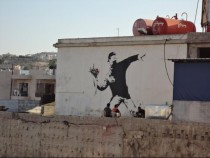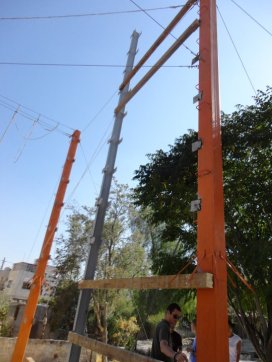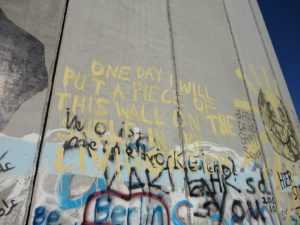Two years teaching in the government schools of Abu Dhabi had jaded me.
So during the summer of 2011, my girlfriend at the time and I decided we’d spend the summer volunteering at whatever projects would have us. I immediately wanted Palestine; I wanted to see that mess close up and see if it made any more sense when one was standing there. We found positions, ones that we paid to take part in, and took off for Bethlehem the day our schools let us.
It was goddamned hot that time of year, pushing well above 35 Celsius (95 Fahrenheit) and skirting with 40 (104 Fahrenheit) at one point. The dry heat made it mostly bearable, but we were outside eight hours a day without much shade. One of the volunteers got heat stroke one day while trying to secure a crossbeam that was to make up the super structure of the wall. I got more tanned on my neck and arms that I’d been since I was five in Hawaii. I learned to drink shit-tons of water under the blistering heat.

Now I’m from a desert myself, but here’s the secret of modern desert peoples – we fucking hate the heat. Very few of us relish the idea of burning afternoons and nightmarish stints by the pool. We were born and sheltered and grew up in air conditioning. That’s our true natural environment. Being outside, except during the handful of days when deserts are quite nice, is considered a burden.
Worse, behind us, was a hotel with a pool. I couldn’t see the pool, but I could damn well hear it. All day long kids splashed and laughed and swam and I heard every fucking drop rolling around as some pool DJ played the globalized hits of that summer.
One of the key things about living in the Arab world is knowing your local demographics, because by doing so you can predict how easy it is to get a beer. In any country with a long-established Christian minority, there are local beers and wines. The more Christians, typically the better and more plentiful the beer. Palestine’s Christian minority has been around forever, but under the stress of war most of their brewers (typically in monasteries) have long closed up. Except Taybeh beer, a lovely wheat out of Ramallah.

After a long, horrible day in the sun, the volunteers would often walk to the center of Bethlehem, where a couple of bars sat in truly ancient and holy places. The place, after dark, was always a ghost town. Masked men in camouflage, carrying assault rifles, rode by in pick-up trucks, members of the Palestinian Authority’s police. On the walls long-irrelevant political parties scribbled maps of a united Palestine with slogans long past their expiration date.
The Israeli-owned tour buses would swarm the place with pilgrims during the day, but few people stayed overnight. The tour guides would often tell people the area was dangerous, full of criminals, and herded them around as if they were visiting the Bronx in 1988. We had the streets to ourselves.
One night, after a brutal day in the sun, we were working our way to the bars downtown. Two of the volunteers stopped near a field. They exchanged some words, including, “Should we do something?”
I didn’t give it much thought. After witnessing the fucked up world of the West Bank and living in the equally fucked but less morally outrageous UAE, my center was well and truly off. Whatever it was, it was just another unsolvable problem, another injustice I could do nothing about, about thing to shrug and quietly remember that such things were the results of the conditions there.

On the way home, past the same spot, a bit drunk, we stopped again. There was meowing; a litter of kittens were strewn in the field, new borns, clawing and scraping and calling for their mother, who had apparently fled the scene and wasn’t coming back.
Not far from that spot the Israeli separation barrier loomed, the black windows of the parapets looking out onto the city, judging with their sniper rifles. Beyond that was Jerusalem, where the Israeli settlement machine was slowly chewing up Arab communities. Beyond that, Nablus, where a boy had been shot and killed by troops not long before. Beyond that, even, Syria, where the rebellion against Bashar Assad was growing into a murderous rage. This was the context in which I froze up, watching those kittens, realizing that to take them on was yet another unsolvable monstrosity of the place I stood.
We left them there, went home, and went to bed. The next day, when we walked by the field on our way to the center, they were dead. Flies were already tunneling through them, their tiny bodies caking under the sun.
At the time, I felt I could no more save them than I could save the people who lived under threat of the rifles and tanks of the Israeli army, could no more save those in Israel who feared the suicide bombers of the West Bank, or the protesters of Damascus, or the kids back in my Emirati school who were being denied truth and knowledge because it made their elders uncomfortable. It was another thing to shrug; another thing to walk by and forget about.
Only I haven’t forgotten. I know what I did was wrong, but I still wonder how wrong. The burden of their lives was worth my effort, but I walked by and went to sleep instead. In such a place, the decision felt easy.
I wonder if, when I die, it’ll be held against me. I hope not. But if it is, I’ll understand.